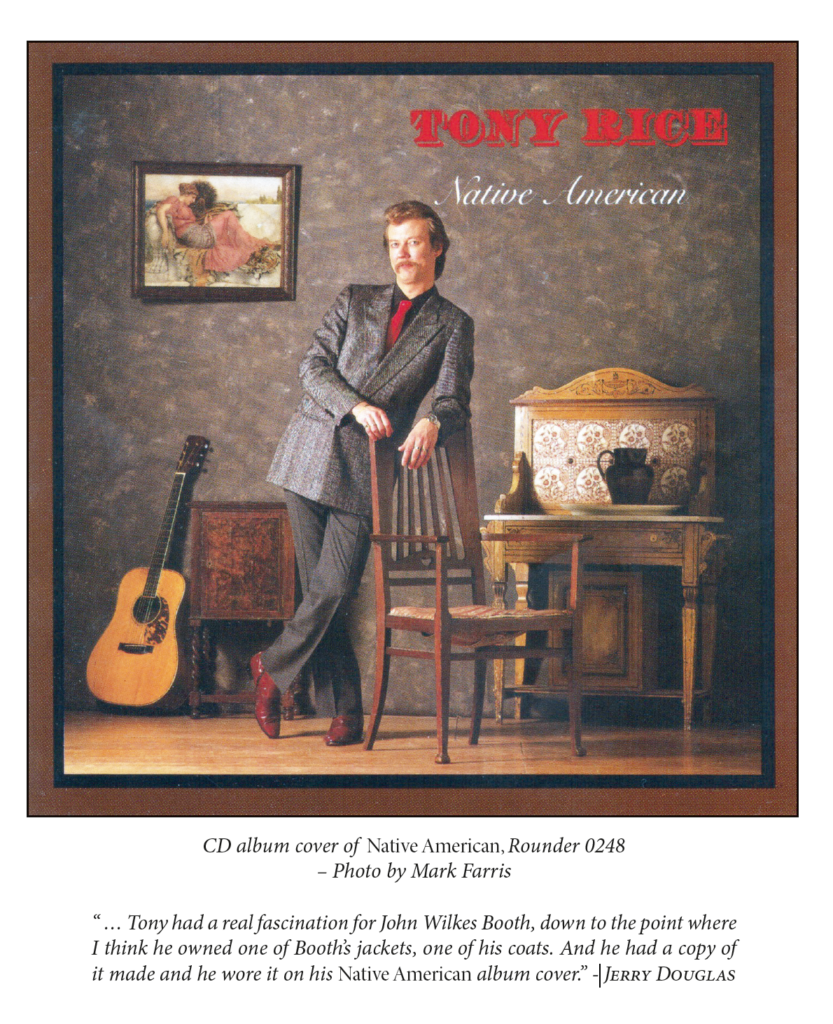
Tony’s interest in John Wilkes Booth (JWB) – the actor and President Abraham Lincoln’s assassin – was with him when we played together in the 1970s. Books about Booth were lying around his Corte Madera apartment.
Ron Rice wrote, “I do know he was a JWB nut. I have seen a couple of photos of him wearing a jacket similar to the one on the [Native American] album cover standing beside or leaning against JWB’s gravestone.” About these graveside photos, Pamela Hodges Rice wrote, “Bill, there was one in the bedroom before the flood in Crystal River. Tony had it level with the bed for some reason. On the side next to the blue bathroom. It most likely washed away when the swirling of returning water went back out to sea. I’m sure there were negatives of it, but I’m not sure if they survived.”
In his interview, Jerry Douglas suggested that Tony was “more interested in the lifestyle of Booth and the way he always dressed better than the other actors.” Ron Rice made the point that Tony was more interested in Booth the actor. I’m sure they’re both right.
On the other hand, Tony commissioned Mary Chapin Carpenter to write a song about Booth he recorded on Native American, one she titled “John Wilkes Booth.” The song calls Booth “a patriot.” Mary wrote it, but apparently Tony had asked her for a rewrite of the song. Jerry said, “I remember Chapin coming into the studio with the finished version of it because Tony asked her to rewrite something and then she came in and we cut the song.” I don’t know what the rewrite was about … the music, the lyrics, both … ? I tried to make contact with Mary Chapin Carpenter about this, but never heard back.
Mark Schatz spoke of that album: “I think the name of [that recording, Native American] has to do with his perception of what native American was. I don’t think it was native American like the people who lived here before [Columbus arrived]. I think it was kind of ‘us,’ … white people. There might have been a little resentment of immigrants, newcomers. I heard Tony make some disparaging comments from time to time, about someone working at the 7-11, ‘can’t hardly speak English,’ or something.” Norman Blake told Schatz that Tony referred to his Lincoln Continental as “Wilkes Booth.”
Kari Estrin, Tony’s agent and manager for about five years, wrote this: “I didn’t really want to engage in looking at John Wilkes Booth as a patriot – so I guess his views are in Chapin’s song. “I thought it odd about his fascination with Booth, he would talk about him and about some aspect of his life, and kept reading more about him … but didn’t delve into his thing with Booth. But it occupied Tony’s time – and yes, that coat was worn on Native American. He was quite proud of that!”
Tony played with Mountain Heart from approximately 2009 to 2012. Josh Shilling, one of his band mates, wrote me, “He did mention John Wilkes Booth occasionally. I remember that he would sometimes sign the end of his text messages as “JWB.” I feel like I remember him leaving voice mails that way as well. ‘Hey baby, call me back … it’s John Wilkes Booth.’ … I’ve always heard stories about Tony and JWB.”
So Tony was interested in Booth from at least Jerry’s time with him, in 1974, to at least 2012 and Mountain Heart. Forty years, possibly more. Finally, in the Native American liner notes, Tony wrote, “Speaking on behalf of Mary Chapin as well as myself, neither of us could condone such a criminal act as the one committed by John Wilkes Booth.”
Looking at these stories from people who were with Tony at various points in his life, it appears he was widely read and well informed about John Wilkes Booth. His interest spanned at least four decades. He was a student of a man we think of as Lincoln’s assassin, but whom Tony thought of as … as what?
A person can become enraptured by a historic figure, and Tony’s long obsession with Booth was that. What initiated his fascination – Booth as assassin, actor, dapper dresser, or yet something else – is unclear.
What is clear to me is that Tony’s interest in JWB was another layer of his layered being.